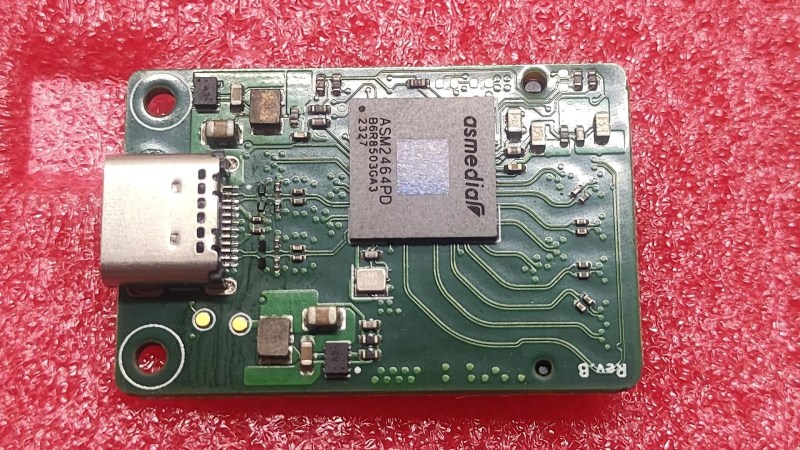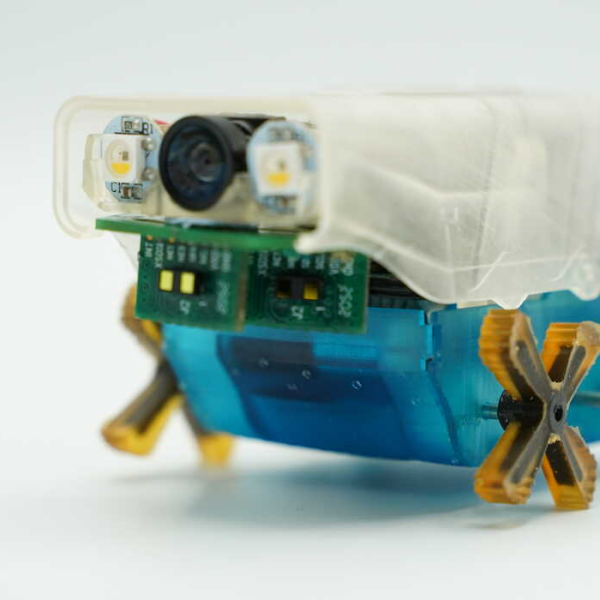Thunderbolt has always been a functionally proprietary technology, held secret by Intel until “opening” the standard in a way that evidently wasn’t enough for anyone to meaningfully join in. At least, until last year, when we saw announcements about ASMedia developing two chips for Thunderbolt use. Now, we are starting to see glimmers of open source, letting us tinker with PCIe at prices lower than $100 per endpoint.
In particular, this board from [Picomicro] uses the ASM2464PD — a chipset that supports TB3/4/USB4, and gives you a 4x PCIe link. Harnessing the 40 Gbps power to wire up an NVMe SSD, this board shows us it’s very much possible to design a fully functional ASM2464PD board without the blessing of Intel. With minimal footprint that barely extends beyond the 2230 SSD it’s designed for, curved trace layout, and a CNC-milled case, this board sets a high standard for a DIY Thunderbolt implementation.
The main problem is that this project is not open-source – all we get is pretty pictures and a bit of technical info. Thankfully, we’ve also seen [WifiCable] take up the mantle of making this chip actually hobbyist-available – she’s created a symbol, fit a footprint, and made an example board in KiCad retracing [Picomicro]’s steps in a friendly fashion. The board is currently incomplete because it needs someone to buy an ASM2464PD enclosure on Aliexpress and reverse-engineer the missing circuitry, but if open-source Thunderbolt devices are on your wish list, this is as close as you get today – maybe you’ll be able to make an eGPU adapter, even. In the meantime, if you don’t want to develop hardware but want to take advantage of Thunderbolt, you can build 10 Gbps point-to-point networks.

















Are you really so offended by it not being open source that you won’t even credit the maker? I’m pretty sure it wasn’t designed by Reddit, so you could have stuck [Picomicro] in there…
what? no! that’s merely a “how I write things” aspect, sometimes I forget to do this, and due to the last paragraph mention, my brain went like “oh it’s there”; fixing!
That was a wonderfully useful article Arya, thanks!
I think you are in the wrong neighbourhood pal.
Hacking is about sharing knowledge and not just playing a money game, so if you don’t understand why someone would prefer open source to closed source *here* maybe you should go over to hackernews or Engadget.
What? There are plenty of hacks in closed products and have always been.
A hack is a hack, simple as that.
Now this isn’t really a hack is it? Using a product designed for a certain purpose for that purpose …
With that said I can see it used in a lot of relevant projects in the future so it still relevant. :)
This is chipping away at a problem, where the journey is as important as the destination.
These hacks, by and large, don’t reach the hacker community in the way that, and thus aren’t that much useful for us.
If it weren’t for [WifiCable]’s board, I wouldn’t be covering this – without it, it’s yet another closed-source boards that might get crowdfunded in the future, potentially, and that just ain’t interesting. There were always chips for Thunderbolt like JHL series that you could get from third-party sources on boards or standalone. The start of the reverse-engineering effort is what made this coverage-worthy for me.
That doesn’t entitle you to be rude.
What? No, Sunoo, I don’t agree with you, you’re being weird by interpreting an honest mistake as something intentional. Please stop doing that.
Put away the pitchfork – no need to be so offended nor to put false accusations out there. Try a more friendly approach next time.
On the not being open source, I kinda wondered what the point of putting the project here is if the maker can’t be bothered to share so others can build on it. Without more details it’s just a “look at me” posting that’s not very valuable.
Apparently, the Reddit board is under an NDA. That said, yeah, it happens quite a bit somehow 🥲 I spend quite a bit of time thinking how we can make things better in this regard.
USD55 for the ASM2464PD online from a questionable source. Sigh.
Nevermind. It’s SGD55. Still high, but definitely not that bad.
Niiice. Hoping I get my pocket GPU enclosure soon. I’ve got a few low profile cards I could put in it.
A little info to start you making your own: https://github.com/a-little-wifi/ASM2464PD-test
As per link below, there’s numerous ASM2464PD-based M.2 NVMe to USB4v1 enclosures, as well as a ADT-Link UT3G PCIe to USB4v1 eGPU adapter in existence already if don’t want to hack up a solution yourself.
https://egpu.io/forums/thunderbolt-enclosures/usb4-m-2-enclosure-with-egpu-r43sg-4-0-work/paged/24/#post-110845